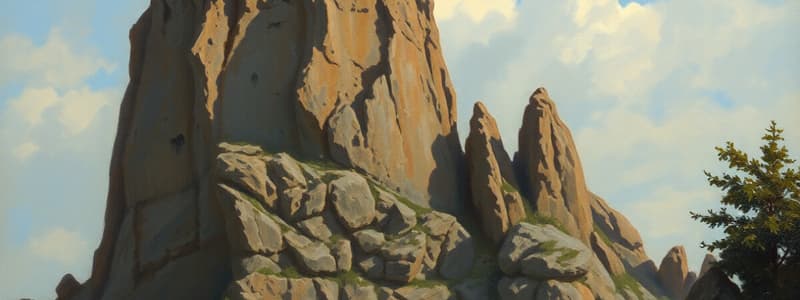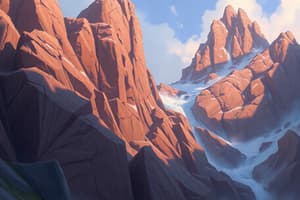Podcast
Questions and Answers
What is the process called when rocks break down into smaller fragments?
What is the process called when rocks break down into smaller fragments?
- Sedimentation
- Lithification
- Weathering (correct)
- Erosion
Which type of weathering involves the effects of temperature changes?
Which type of weathering involves the effects of temperature changes?
- Hydrolysis
- Biological weathering
- Freeze-thaw weathering (correct)
- Chemical weathering
What can cause chemical weathering of rocks?
What can cause chemical weathering of rocks?
- Acid rain (correct)
- Wind erosion
- High temperatures
- Bacteria from soil
Which type of environment is most likely to experience exfoliation weathering?
Which type of environment is most likely to experience exfoliation weathering?
What effect does freeze-thaw weathering have on rocks?
What effect does freeze-thaw weathering have on rocks?
In what way does biological weathering occur?
In what way does biological weathering occur?
What is a major physical force that can result from freeze-thaw weathering?
What is a major physical force that can result from freeze-thaw weathering?
Which of these is NOT a factor in causing physical weathering?
Which of these is NOT a factor in causing physical weathering?
Which type of weathering primarily affects rocks in a mountainous environment?
Which type of weathering primarily affects rocks in a mountainous environment?
What physical effect does freeze-thaw weathering have on rocks?
What physical effect does freeze-thaw weathering have on rocks?
What initiates exfoliation weathering in rocks?
What initiates exfoliation weathering in rocks?
Which organism type is least likely to contribute to biological weathering?
Which organism type is least likely to contribute to biological weathering?
What is a key factor in differentiating physical and biological weathering?
What is a key factor in differentiating physical and biological weathering?
Which type of weathering is most likely to occur due to acid rain?
Which type of weathering is most likely to occur due to acid rain?
How does temperature change affect rocks in physical weathering?
How does temperature change affect rocks in physical weathering?
What is the end result of the weathering process?
What is the end result of the weathering process?
Flashcards
Weathering
Weathering
The breakdown of rocks into smaller fragments.
Physical Weathering
Physical Weathering
Breaking down rocks into smaller pieces by physical forces, like temperature changes and water.
Exfoliation Weathering
Exfoliation Weathering
Rock breaking apart due to repeated heating and cooling.
Freeze-thaw Weathering
Freeze-thaw Weathering
Signup and view all the flashcards
Biological Weathering
Biological Weathering
Signup and view all the flashcards
Chemical Weathering
Chemical Weathering
Signup and view all the flashcards
Frost wedging
Frost wedging
Signup and view all the flashcards
Acid Rain
Acid Rain
Signup and view all the flashcards
What is weathering?
What is weathering?
Signup and view all the flashcards
Types of Weathering
Types of Weathering
Signup and view all the flashcards
How does freezing water cause damage?
How does freezing water cause damage?
Signup and view all the flashcards
What is the difference between physical and chemical weathering?
What is the difference between physical and chemical weathering?
Signup and view all the flashcards
Study Notes
Weathering
- Weathering is the breakdown of rocks into smaller fragments, eventually forming soil.
- Rocks change shape and size due to environmental conditions.
- Weathering can be caused by temperature changes, water, frost, plants, and animals.
Types of Weathering
- There are three main types of weathering: physical, biological, and chemical.
Physical Weathering
- Physical weathering breaks down rocks into smaller pieces without changing their chemical composition.
- Exfoliation weathering, also known as "onion-skin" weathering, is caused by extreme temperature changes (heating and cooling). This causes outer layers of rock to flake off.
- Freeze-thaw weathering is caused by the freezing and melting of water within cracks in rocks. The expansion of water when it freezes puts pressure on the rock, causing it to break apart.
- Physical weathering commonly happens in areas with extreme temperature ranges and areas with varying amounts of water and ice.
Biological Weathering
- Biological weathering involves the disintegration of rocks due to the actions of organisms, like bacteria, plants, and animals.
- Plants growing in cracks can exert pressure, causing rocks to break.
- Animal activity, such as burrowing, can create pathways and move material, contributing to the breakdown of rocks.
Chemical Weathering
- Chemical weathering changes the chemical composition of rocks by dissolving or altering minerals.
- Slow chemical weathering occurs when rainwater, which naturally contains a weak acid (carbonic acid) due to dissolved carbon dioxide, reacts with minerals in rocks, over time, causing minerals to dissolve.
- Rapid chemical weathering arises through more acidic rainwater (acid rain) caused by air pollution. Burning fossil fuels releases oxides of sulfur and nitrogen into the air, making rainwater more acidic and accelerating the chemical decay and erosion of minerals much faster.
- Acid rain quickly affects rocks, leading to faster erosion.
Rocks and Weathering
- Different rocks respond differently to weathering. The composition and structure of a rock affect its vulnerability to various types of weather.
- Investigating various types of rocks provides insight into their susceptibility to weather elements.
- Understanding the effects of weathering on different rocks is crucial for various applications (e.g., construction).
Studying That Suits You
Use AI to generate personalized quizzes and flashcards to suit your learning preferences.




